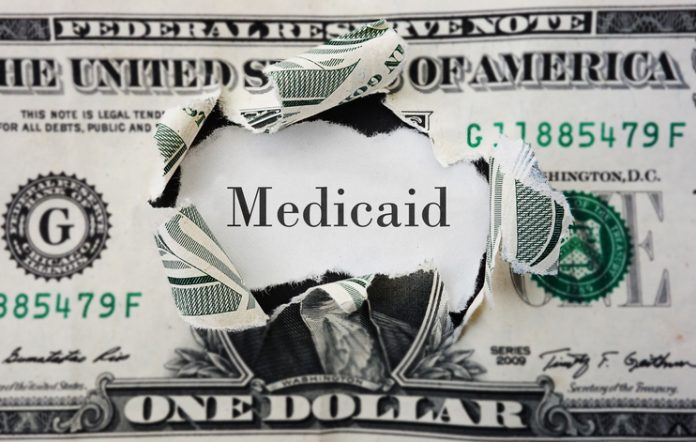As states come under heavy pressure to expand their Medicaid programs with the lure of billions of dollars under the American Rescue Plan Act (ARPA), concern grows that no place in the nation will be left to try innovative, health care reforms that could improve health care coverage and lower costs.
“It is important to remain independent because by expanding their Medicaid programs, these states will lose the flexibility to innovate,” said Matt Dean, a senior fellow for health care policy outreach at The Heartland Institute, which co-publishes Health Care News
Currently, there are 12 states that have held out expanding Medicaid under the Affordable Care Act. Expansion covers able-bodied adults who fall within 138 percent of the federal poverty level. There is no deadline for states to implement expansion. The 12 holdout states include Alabama, Florida, Georgia, Kansas, Mississippi, North Carolina, South Carolina, South Dakota, Tennessee, Texas, and Wisconsin, according to Kaiser Family Foundation.
The Lure of Federal Money
North Carolina is the latest state to come under heavy pressure to expand Medicaid. The administration of Gov. Roy Cooper, a Democrat, made a pitch to the Republican-led House-Senate committee on March 1. Legislators would have to approve expansion, and according to a report by WRAL.com, Senate leader Phil Berger is now open to the idea.
North Carolina Medicaid Director Dave Richard told lawmakers under the COVID-19 relief package, North Carolina could reap $1.5 billion in additional revenue. A non-partisan analysis by the General Assembly said expansive could be a “fiscal net positive” in the first two years. After that, the state would be on the hook for $500-$600 million, annually.
“This is a program that is financially self-sustaining,” said Richard.
Kansas and Wisconsin are two other states where Democrat governors are tangling with Republican-led legislatures to expand Medicaid. Kansas Gov. Laura Kelly included expanded Medicaid in her 2023 budget that reflects the additional money from ARPA. She also proposed a work referral program.
Republican legislators in Wisconsin have put up a tough fight against Democrat Gov. Tony Ever’s special session last year to include expansion in the 2022-2023 budget with new incentives from ARPA. The legislature adjourned the special session with no action.
No Such Thing as “Free”
Wisconsin and other expansion holdout states would be smart to resist the lure of additional federal money, says Dean, who has been working closely with legislators in states like Wisconsin.
“Wisconsin should instead provide targeted help to expand coverage without harming the care or breaking the bank of middle-class folks who pay premiums individually or through their employer,” wrote Dean in a document he is drafting to help legislators decide.
Dean, who served six terms in the Minnesota legislature, says expansion of Medicaid can break down the private health care market. “Wisconsin need only look to her neighbor, Minnesota to find that the costs are high and that not all those costs are financial,” wrote Dean.
Medicaid expansion can also “crowd out” the private market.
“Private insurers fled. Premiums jumped as much as 56.7 percent and networks shrank,” said Dean.
As for state budgets, huge cost overruns are to be expected, says Dean Clancy, a senior health policy fellow for Americans for Prosperity.
“We’ve seen it in state after state. Whatever number of people you expect to sign up. Multiply it by 150 or 200 percent,” said Clancy. “People always come out of the woodwork for free health care, including people who were eligible for regular Medicaid but didn’t bother to show up before hearing about the expansion. And P.S. Don’t be surprised when Congress pulls the funding rug out from under you.”
Waivers Allow Innovation
The Trump administration encouraged states to redesign their Medicaid programs under Section 1115 waivers. Some states took advantage and introduced things like work requirements, to help enrollees earn more money and have a springboard to private insurance from an employer.
A “Medicaid Waiver Toolkit” published by the State Policy Network, has given states a list of measures that could bolster their health insurance markets such as allowing more direct primary care, lower-cost surgical options, health savings accounts, and “skin in the game” requirements for able-bodied enrollees.
“The Trump administration recognized States are far better positioned to design health care programs that meet the needs of their residents and worked closely with states to develop innovative waivers from both Medicaid and Obamacare requirements,” said Peter Nelson, a senior policy fellow at the Center of the American Experiment who previously served as a senior advisor to the Seema Verma, the Administrator at the Centers for Medicare and Medicaid Services (CMS) under the Trump administration.
“Though the Biden administration is less receptive to these waivers, states should continue pursuing waivers that can pass muster today, as well as developing blueprints for bigger waiver ideas that can be achieved in a new administration,” said Nelson.
State are the best laboratories for reform, says Clancy.
“Every state is different, so their safety nets have to be different. Back in the ‘90s, states drove national welfare reform from the bottom up. Today states could do the same thing and drive national health care reform from the bottom up if Uncle One-Size-Fits-All would let them,” said Clancy.
States were making big progress when CMS was more open to waivers, says Clancy.
“Texas had creative ways of providing benefits. Indiana experimented with personal health savings accounts for enrollees. Rhode Island had something similar to a block grant,” said Clancy. “Unfortunately, expansion has created budgetary pressures that tend to suppress creativity. And the left’s Medicaid expansion obsession has caused CMS to become actively anti-state-flexibility. It’s sad.”
AnneMarie Schieber (amschieber@heartland.org) is the managing editor of Health Care News.





















[…] post Medicaid Expansion Could Jeopardize Reform Opportunities appeared first on Heartland Daily […]